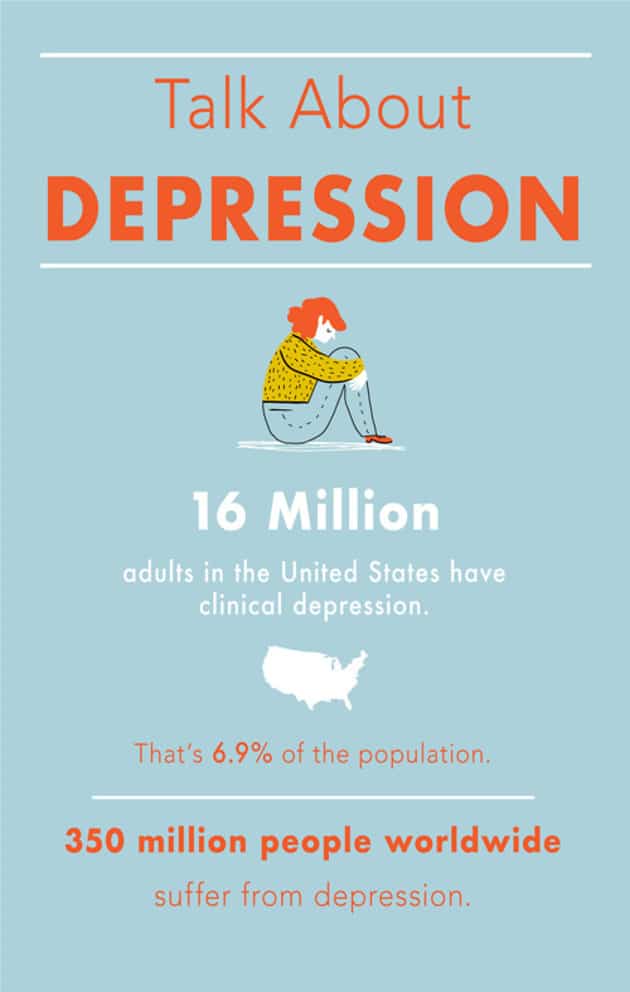
Everyone feels down and depressed every once in a while, but some people go through the unfortunate trial of depression on a whole other level, and suffer from major depressive disorder, or clinical depression.
About 350 million people suffer from depression (you probably know a few of them). And if you're like me, you probably want to be there for support ... but you're not exactly sure how.
My husband told me early on in our relationship about his own clinical depression, and though this revelation did nothing to sway my love for him, it did make me nervous and fearful.
I wasn't familiar at all with the disorder - how was it going to affect our future? But more importantly, what did I need to do to be a supportive partner to him? I wanted to help him as much as I could, but I was afraid I'd do something wrong because I had now idea where to begin fulfilling this role.
Luckily, through our years together, I've gained some insight on how to help your loved one with depression - whether they are your spouse, child, friend or anyone else you love.
1. Have the right mindset about depression
Know that your loved one wants you to consider depression the same way you'd consider physical illnesses. There shouldn't be any more shame in going to a therapist or psychiatrist to heal from a mental illness than there is in going to a doctor to heal from a physical injury.
2. You can't cure it with love
Early on, I thought if I showed my husband enough love I could cure him of his depression. This mindset was spurred on after he told me he was happier than ever after meeting me.
This was flattering, of course, but though I was helping him, it didn't mean that depression was out of his life. Later on, (even when we were at a ecstatic, cloud nine point in our relationship) he experienced a particularly dark episode of depression. I soon realized that his depression had nothing to do with a lack of love from me.
3. They need your emotional support
"What a loved one can do is provide positive emotional support," my husband reminds me when I ask how I can help. He, along with anyone with depression, need a support team. When you see your loved one suffering, be positive. Encourage them. Remind them how strong they are for everything they've overcome so far.
4. Sometimes sources of stress will need to be removed temporarily
A new thing I learned about depression from my husband is how debilitating this illness is. During particularly hard times, your loved one might not be able to fully function physically and mentally.
When that happens, it's easy to feel disgruntled. Why can you just push through and get things done? When you feel like this, remind yourself that if you're mister had been hit with the stomach flu, you wouldn't push him to finish up the yard work. Remind yourself that his mental illness is just as valid as a physical one.
5. Physical activity can help
Something as simple as physical activity can help alleviate the symptoms of depression. I can definitely see how this impacts my husband - when he regularly exercises, his depression hits less frequently and less intensely. Sometimes your loved one will need a little push from you for a workout or a walk, but they'll be grateful for it afterwards.
6. It's no one's fault
"It is important to recognize that it is really no one's fault," my husband reminds me. When my husband was going through a rough episode, I used to immediately blame myself. If I were a better wife, he wouldn't be feeling this.
Don't let yourself believe this. Your loved one's depression has nothing to do with anything you did or failed to do. It's a medical condition completely separate from your actions.
7. Be as understanding as possible
Depression is unique for everyone. Understand that your loved one needs to figure out new things about themselves and better ways to cope with their illness - it's a long road. Show your love patience when things change and patience as they discover how to handle their depression.
8. Having depression doesn't mean they're not happy
My husband is one of the happiest, most cheerful people I know. Most people are shocked if they find out about his depression. When you find out your loved one has depression, don't think that you can't still have many happy moments together and an overall happy life.
Your support as a spouse and friend to those in your life with depression can help them feel loved and confident they can handle their illness. Whether it's your wife, husband, child or friend, understand that people with depression need you to be there for them.


